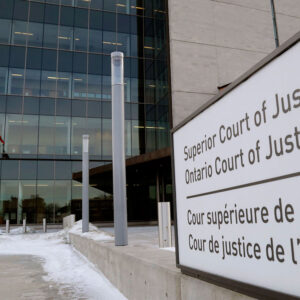MOTIONS IN THE SUPERIOR COURT OF JUSTICE
During the course of a civil lawsuit parties may have disputes over procedural or legal issues that they cannot resolve between themselves or need to take procedural steps requiring permission of the court. To do so, a request for a formal order of the Court, or motion, needs to be brought.
Some motions are made on consent of the parties and can often be dealt with in writing without a need to appear in person in court. In others, the opposing party will take no position and leave it to the court to decide based on the moving party’s submissions. However, most motions are opposed, and in all cases, motions are governed by the procedures set out in Rule 37 of the Rules of Civil Procedure.
The party bringing the motion (moving party) must serve a Notice of Motion on the opposing party, setting out the relief requested from the court and a summary of the evidence, legislation and rules of civil procedure forming the basis of the request, including the date on which the motion is to be heard in court. Most courts only hear motion on one or two days of the week and as a courtesy, moving parties should canvass dates before unilaterally choosing one.
The moving party will need to swear or affirm an affidavit stating the evidence from their personal knowledge, or to the best of their information and belief. Affidavits from more than one person may be included if required. The court will not hear oral evidence from any of the parties on a motion unless other rules of civil procedure permit it (on a summary judgment motion, for example) or in exceptional circumstances.
These documents, together with any relevant transcripts from examinations, and any other material necessary for the motion, must be bound in a motion record for ease of reference.
Longer or more complex motions will require a factum, which is a written argument of the facts and law relied upon by the party. For most other motions, unless the motion is strictly procedural or on consent, it is still helpful to prepare a short factum. The case law and legislation relied upon will be set out in a Book of Authorities referred to in the factum, with the relevant paragraphs and sections highlighted for ease of reference.
Once the Motion Record, Factum and Book of Authorities have been completed, they must be served on any party affected by the order sought, even if they are not a party to the action, and then filed in court with an Affidavit of Service, together with the filing fee.
Motions must be confirmed in writing with the court by 2:00 p.m. three days before the date of the motion (excluding weekends and holidays). The confirmation will set out that the moving party has confirmed or attempt to confirm with the other party they agree to proceeding with the motion on that date, how much time for oral argument they will need, and what evidence will be referred to. If this confirmation is not filed with the court, the court will not hear the motion and the moving party may be put to the expense of re-serving and re-filing the motion.
The moving party will speak first before the judge, provide a brief summary of the case, the relief being sought in the motion, and whether the motion is on consent, unopposed, or opposed. The moving party will then make oral arguments, based on the affidavits, factum and book of authorities, and will often be asked questions by the judge. The responding party will then make their oral arguments, and if they have raised new issues in those arguments, the judge may ask for submissions from the moving party.
The judge may issue an oral ruling from the bench at the end of submissions, with or without written reasons to follow, or may reserve his/her decision and issue a written decision later.
The successful party is generally entitled to its costs and both parties should prepare in advance a schedule of the legal fees and disbursements incurred for the motion in case the judge decides to receive submissions on costs in court at the motion itself.
The moving party should also have a draft order prepared setting out the relief requested, as they will be responsible for drafting the order to reflect the judge’s decision and filing it with the court.
These are only the basics of a contested motion in the Superior Court and whether and when to bring a motion, and for what, can change quickly in your case. The lawyers at Alemi Law Group are experienced with motions and managing the process to help obtain a fair and just result and strengthen your case for settlement or trial.
Disclaimer: To the full extent permitted by law, Alemi Law Group does not make any warranties, conditions, representations of any kind as to the accuracy of this publication and other contents on this website. Accessing or using this website does not form a lawyer-client relationship. Individuals and companies do not become clients of Alemi Law Group and/or its lawyers until such time as Alemi Law Group accepts to represent and that it is confirmed in a formal retainer agreement outlining the exact nature of the legal relationship.


Add a Comment